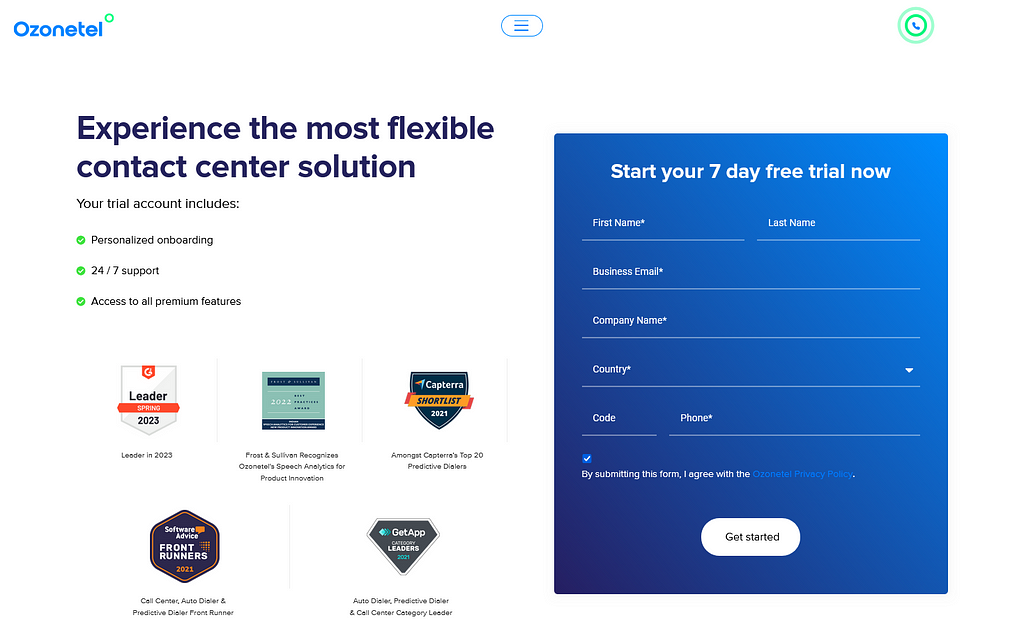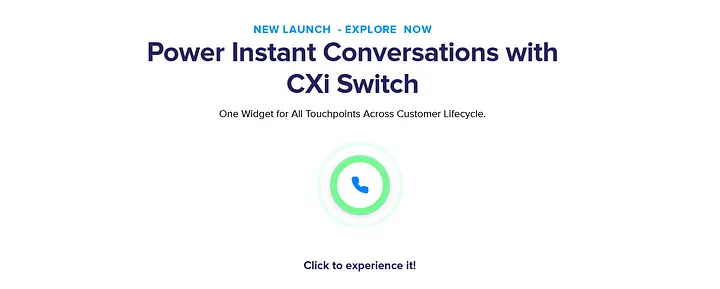- Resources
- 12 Best Cloud Telephony Providers and Software in India
12 Best Cloud Telephony Providers and Software in India

Cloud telephony services have gained immense popularity over the last few years, allowing businesses to place & receive calls directly from any computer or mobile device with an internet connection. It has also freed businesses from the burden of buying and storing stand-alone hardware, like PBX boxes and handsets. Essentially, cloud telephony operates through an internet connection, offering flexibility and convenience.
The global cloud telephony service market continues to see an upward trend having reached $20.23 billion in 2022 & is expected to reach $34.72 billion by 2028 with a CAGR of 9.25% in coming years. This VoIP-based solution combines various communication and collaboration tools, including voice calls and video conferencing, into a single online platform.
This article describes in detail the importance of cloud telephony service providers in India, how to procure the best cloud telephony solution for your business, and which are the best cloud telephony providers that every business should know about.
Best Cloud Telephony Service Providers
| Software Name | Best For |
|---|---|
| Ozonetel | Cloud-based communication solutions |
| Ring Central | Unified communications and collaboration |
| Vonage | Business communication and collaboration |
| Twilio | Cloud communications and building scalable applications |
| Phone Burner | Sales dialing and productivity |
| Nextiva | VoIP business communication |
| Exotel | Cloud telephony and communication APIs |
| CloudConnect | Cloud-based communication and collaboration |
| Jive | Unified communications for businesses |
| Mitel | Business communication solutions |
| Ameyo | Customer engagement and call center software solutions |
| TeleCMI | AI-powered cloud-based communication platform |
What is Cloud Telephony?
Cloud telephony is a phone system that operates over your internet connection and enables you to migrate your business phone service to the cloud. The system simplifies enterprise communications and expands with your needs. Whether you’re setting up a call center, recruiting remote workers, or growing your in-house teams, cloud telephony will make the process simple and affordable.
Key Features of Cloud Telephony Solutions
Here are the key features of cloud telephony solutions, providing seamless connectivity for modern businesses.
Streamlined Communications: Cloud telephony simplifies your enterprise communications. It replaces traditional landlines with a modern, cloud-based system, making it easier to manage and scale as your business grows.
Unified Communications: As part of Unified Communications as a Service (UCaaS), cloud telephony goes beyond voice calls. It seamlessly integrates with video meetings, instant messaging, CRM tools, and other collaboration platforms. This unified approach enhances team connectivity and productivity.
VoIP Service Provider: When you dial a phone number, your VoIP service provider handles the routing. It converts analog voice signals into data packets and transmits them over your internet connection. This efficient process ensures clear communication.
Flexible Endpoints: Instead of traditional landline phones, you can use VoIP desk phones, softphones (software-based phones), or mobile apps. These endpoints connect you to the person you’re calling, all within a user-friendly interface.
Online Management: Cloud telephony allows you to manage your business phone system through an online dashboard. You have full control over phone numbers, call forwarding, user additions, and more.
Why Your Business Needs a Cloud Telephony Software?
Cloud telephony solution is designed to provide businesses with a virtual phone system that can be accessed from anywhere and at any time using an internet connection. This type of software provides a range of features such as call forwarding, voicemail management, call routing, and more. In addition, many cloud telephony solutions offer advanced features such as analytics, call recording, and integration with other applications.
How to Choose the Best Telephony Software?

When choosing the best telephony software for your business, consider the factors given below.
1. Research & Learn
Research the features and capabilities of the different telephony software options available in 2024. Make sure you have a good understanding of what the software can do and how it can help your business.
2. Avoid Complexity
Look for software that is easy to use and understand. Make sure it has a user-friendly interface and that it is compatible with the systems and hardware you already have in place.
3. 24*7*365 Customer Support
Consider the customer service and technical support offered by each software provider. Make sure you choose a provider that offers quality and reliable customer support.
4. No Hidden Cost
Check for any additional fees associated with the software. However, the pricing model should best suit your requirement, end-user number, and project duration. Make sure you’re aware of any hidden costs.
5. Ensure Cyber Security
Make sure the software is secure. Ensure the software is regularly updated to protect against any security vulnerabilities like cyber-attacks, which can lead to millions of losses through ransomware, etc.
6. Informed Decisions Are the Best
Read customer reviews and feedback to get a better understanding of the customer experience. This will help you make an informed decision on the best telephony software for your business.
Top 12 Best Cloud Telephony Software
To help you in making an informed decision, we’ve compiled a list of the top 11 cloud telephony software solutions for the year 2024. Whether you’re a small startup or a large enterprise, our carefully selected list ensures that you’ll find an ideal cloud telephony solution to streamline communication processes, enhance customer interactions, and drive business growth.
1. Ozonetel

G2 rating: 4.6/5
With Ozonetel’s cloud telephony solutions, you can quickly and easily access all call controls, including hold, mute, and transfer, from the Ozonetel dashboard with just one click.
Features:
- Access to advanced APIs for personalization
- Seamless integration with social media platforms like Facebook, WhatsApp, etc.
- Allows modification of IVR
- Drag and drops facility with zero coding requirements, among others.
Reasons to buy:
- Ozonetel’s telephony solution is amongst the best telephony software of 2024 because of its ability to understand customer sentiments and respond in a natural way over the call or on chat.
- It also assists the call handler with automatic screen pop-ups with relevant caller details to enhance call personalization and time-saving.
User review: “Robust contact centre solution”
2. RingCentral

G2 rating: 3.9/5
RingCentral is one of the most popular cloud telephony software offering unlimited calling, caller ID, call forwarding, live chat tracking, etc.
Features:
- progressive dialing
- preview dialing
- predictive dialing
- seamless integration with several CRM platforms like Salesforce, Zendesk, etc.
Reasons to buy:
- The in-built drag-and-drop builder assists in the creation of unique automatic call scripts for various scenarios. This is especially useful during busy times and is often called Interactive Voice Response (IVR).
- RingCentral provides tailored solutions for companies in a variety of sectors, including technology, retail, healthcare, finance, education, and more.
User review: “I love the customization of the product. I get to choose hold music, how the phone is answered. I can put callers on hold and pick up from another device. I can send and receive text messages. All around it’s a great tool for the small business owner.”
3. Vonage

G2 rating: 4.3/5
Vonage software offers a full range of features and services. Call forwarding, adaptable calling plans, voicemail, an automated attendant, and call screening are some of these services.
Features:
- Mobile app integration.
- Extensive analytics.
- CRM system connection.
Reasons to buy:
- Users can easily manage their time more effectively using Vonage and keep track of customer and sales calls.
- Offers consumers a safe and dependable connection by ensuring that all calls are routed through the safest and most secure networks.
User review: “Vonage has everything you need in a business telecom provider.”
4. TeleCMI

G2 rating: 4.8/5
TeleCMI is an AI-powered cloud-based communication platform trusted by over 2500+ companies globally. It offers efficiency, flexibility, and essential features, seamlessly integrating with your favorite CRM tools and APIs to streamline workflows and automate tasks. TeleCMI offers top cloud telephony solutions that enhance global business efficiency, productivity, and customer satisfaction throughout the entire customer journey.
Features:
- Get real-time and accurate call reports directly from the live dashboard.
- Intuitive and user-friendly interface for making business calls.
Reasons to buy:
- Easy and unobtrusive configurations to make your contact center functional in no time.
- Provides communication with top quality of AI-driven voice solutions.
- Removes agents from less demanding cases to concentrate on more involved tasks.
- Excellent support for quick resolution of issues.
- Provides top most security features and easy to use.
User review: Great support and excellent team behind the software.
Features:
- Supports integrations with Salesforce, Zendesk, and other popular applications
- Automated attendants and IVR
- Call forwarding
- Call recording
Reasons to buy:
- Twilio’s APIs and SDKs make it simple to incorporate communication capabilities into web and mobile applications.
- The cloud-based platform from Twilio offers scalability, flexibility, and extensive security features and is appropriate for various organizations and applications.
User review: “ Putting customer’s first”
6. Phone Burner

G2 rating: 4.7/5
PhoneBurner is a cloud-based, auto dialing application that uses VoIP to make calls, making it accessible from anywhere and a great choice for remote teams. Your sales force may make up to 80 calls per hour with its auto-dialing feature.
Features:
- Sort leads using a variety of advanced lead management tools, including location, tags, last call time, and others
- Seamless integration with existing CRM software
Reasons to buy:
- Allows limitless pre-recorded voicemails to be available.
- Real-time follow-up text messages and emails can be sent instantly within the app.
- Manage your contact list and leads without using an external CRM thanks to Phone Burner’s integrated sales CRM.
User review: “Phone burner makes my daily work task effortless, efficient and easy.”
Features:
- Compatible with popular applications like Salesforce HubSpot, Zoho, and Zendesk
- Comprehensive outbound call management
- The special click-to-call feature enables the team to dial phone numbers of generated fresh leads instantaneously with a single button click
Reasons to buy:
- Eliminates manual dial and switch between different pieces of software.
- Offers time efficiency.
- Enhance the call quality.
- Examine the entire contact information that is already stored in your CRM.
- Supports call personalization and conscious cross/up sales.
User review: “Excellent team setup support and great communication by the Nextiva team.”
8. Exotel

G2 ratings: 4.3/5
Exotel offers simplified customer engagement through omnichannel call-handling functions.
Features:
- Enables remote sales and customer care.
- Call analytics.
- Automatic call routing to the right agents.
- SMS broadcasting services, among others.
- Tracking tools to monitor remote staff.
Reasons to buy:
- Exotel customers benefit from a 24*7 customer service toll-free number.
- Integrated voice call with helpdesk, CRM, applications, etc.
- Streamlines client engagement.
User review: “Excellent cloud-based telephony and message service provider platform.”
9. CloudConnect

Mouthshut.com ratings: 4.7/5
For many enterprises and industries, CloudConnect delivers a scalable, cost-effective, and secure cloud telephony service.
Features:
- Provides mobile and digital PBX for global communication.
- Voice broadcast, NLP, hosted IVR, call analytics, etc.
- Supports cross sales.
- Personalized call handling with historic data analysis.
Reasons to buy:
- Offers instant text messages and attachment sharing with clients.
- It has low hardware maintenance charges, etc.
- Offers access to conference dial-ins and advanced encryption with ads.
User review: “Amazing cloud telephony service for business.”
10. Jive

G2 rating: 4.4/5
Jive (acquired by GotoConnect) is a cloud-based telephony solution created to give small and medium-sized enterprises access to a dependable, cost-effective, and simple-to-use phone system.
Features:
- Auto-attendant
- Call routing, call recording, call monitoring, call queuing
- Call analytics
- Connects easily with current systems, including CRM systems
Reasons to buy:
- Users can make and receive calls.
- Send and receive texts.
- Check voicemail anywhere thanks to its mobile app.
- Call forwarding, conferencing, and audio conferencing.
User reviews: ” Simple to use.”
11. Mitel

G2 ratings: 3.8/5
Mitel telephony software is an excellent choice for businesses that need reliable, high-performance communication solutions.
Features:
- Call routing
- Mobility solutions
- Conferencing
- Voicemail
- Unified messaging
Reasons to buy:
- Inexpensive, secure, and simple to use.
- Cutting-edge functionality and flexibility.
- Compatible with popular applications like Salesforce and Zendesk.
User review: ” Solid UCaaS solution with useful and user-friendly features.”
Features:
- Supports outbound, inbound, and hybrid call center management
- Personalization in call handling
- WhatsApp Business API
- Call handling, forwarding, VoIP
Reasons to buy:
- Enables customer data privacy through data masking.
- Offers click-to-call features.
- Seamless integration with CRM and helpdesk software.
User review: ” Great tool for contact center and contact management.”
Benefits of Cloud Telephony Solution

Adopting a cloud telephony solution can potentially revolutionize your communication infrastructure, making it more efficient, flexible, and cost-effective.
Integrated Communications System in Place
A cloud telephony system empowers your organization with integrated communications that streamline daily workflows. Your team can access a range of tools seamlessly, including CRM tools, instant messaging, email, voice, and video conferencing.
Extensive Mobility and Flexibility
Cloud telephony allows your agents to work from anywhere. They can take calls and answer queries even when not in the office. All they need is a smart device and a stable internet connection.
Scalability and Customizability
Cloud telephony solutions offer both scalability and customizability. You can add more users seamlessly to communicate with a larger customer base.
Cost Savings
Cloud telephony systems enable significant cost savings for your business. You can eliminate infrastructure costs associated with traditional desk phone systems.
Reliability and Security
Cloud telephony services provide reliable uptime and robust security measures. Your communication channels remain accessible even during disruptions.
Advanced Call Features
Cloud telephony offers features like call routing, IVR menus, call analytics, and voicemail transcription. These enhance customer interactions and streamline communication.
Global Reach
Cloud telephony allows businesses to establish virtual phone numbers in different regions, enabling them to expand their reach and serve customers in various geographic locations without physical offices.
Conclusion
Cloud-based telephony solutions are quickly becoming the preferred choice of contact centers due to their scalability, flexibility, and cost savings. Moreover, innovations and the use of artificial intelligence are likely to add greater value in the near future with more competitive pricing and features.
Ready to take control of your call transfer
experience for better CX outcomes?
Frequently Asked Questions
A cloud telephony provider is a company that offers virtual phone system services, allowing businesses to make and receive calls over the internet instead of traditional phone lines. These providers manage the infrastructure and technology needed for phone communication.
When selecting a cloud telephony provider, consider factors such as your business needs, pricing, features offered, customer support, and reliability. Assess their reputation, reviews, and compatibility with your existing systems to make an informed decision.
Yes, cloud telephony is allowed in India. The Telecom Regulatory Authority of India (TRAI) regulates cloud telephony services, ensuring compliance with applicable laws and regulations to protect consumer interests and maintain the integrity of telecommunications networks.
Cloud telephony works by routing calls through internet-based servers instead of traditional phone lines. When someone dials a business phone number, the call is directed to the cloud telephony provider’s platform, where it is processed and forwarded to the appropriate destination, such as a mobile device or landline.
Prashanth Kancherla
Chief Operating Officer, Ozonetel Communications
Over the past decade, Prashanth has worked with 3000+ customer experience and contact center leaders...
Chief Operating Officer, Ozonetel Communications
Over the past decade, Prashanth has worked with 3000+ customer experience and contact center leaders to comprehensively understand the need for effective and efficient customer communications at every step of their journey with a brand. Deeply embedded in today’s CCaaS ecosystem, he has been instrumental in Ozonetel's growth and contributed in various roles including product management, sales, and solution architecture.









